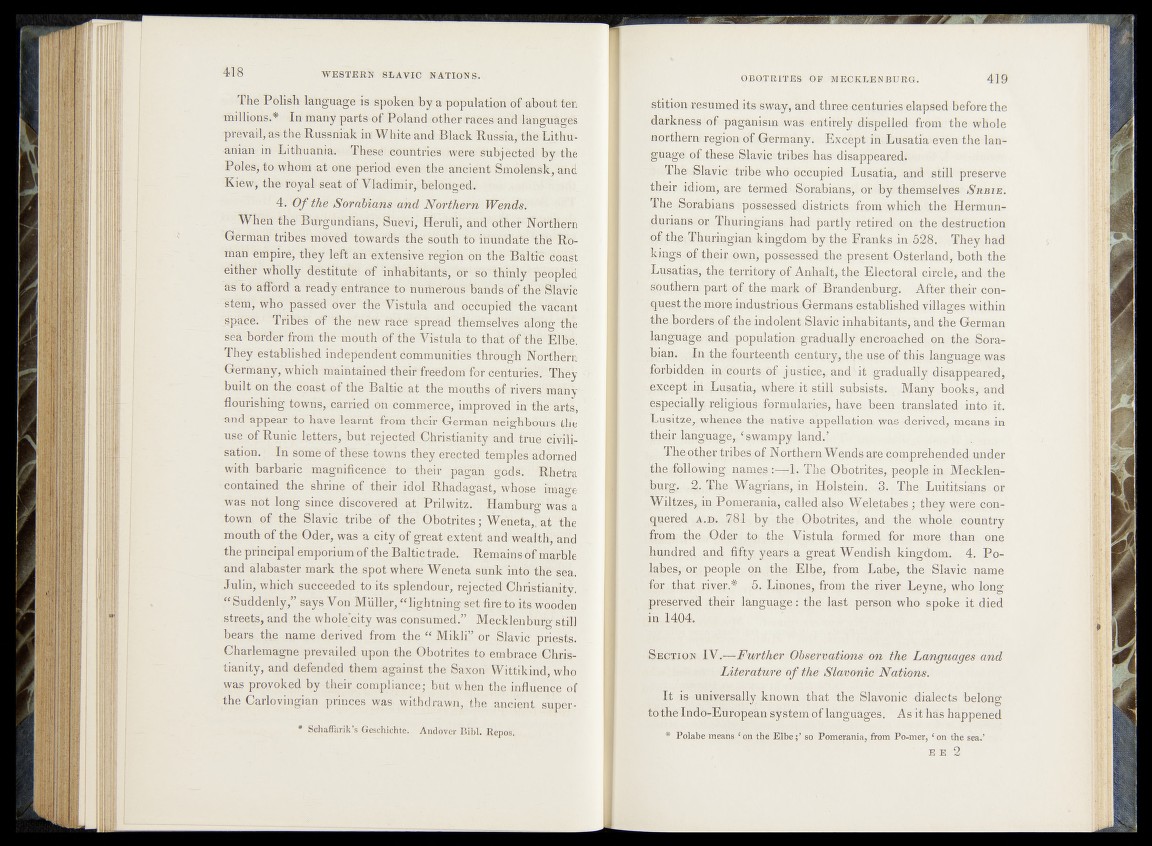
The Polish language is spoken by a population of about ten
millions.* In many parts of Poland other races and languages
prevail, as the Russniak in White and Black Russia, the Lithuanian
in Lithuania. Th®®ö‘ eounLies iwSFe subjected'by the
Poles, to whom at <me period éven the ancient Smoltensll, and
Kiew, the royal seat of Vladimir, belonged.
4. Of the Sornbians and Northern Wends.
When the Ädrg"ühdiäÄ| ^uevi, Efeittli, and other If öWHérh
German tribes moved towards the south to iriundatë th e Ro-
man empire, they left an extensivè regioh On thh B a l t^ f è l f t
either wholly destitute o f inhabitants, Or só'thi'nly peopled
i§ to afford a ready entrance to nuiheVo-Us bands\>f the Sl&vi'c
stem, who passed öVér the Vistula'and 0c6tf]Lied’ ’tHë Vdëan't
jp ie é . Trübes^ of the néW rhèé’ spread themselve'S'al’öhg thé
iëa border from, the-moüth of théVistula to thdt óf the Elbe.
They established independent Communities thró i i 1 NorftfOfn
Germany, which maintained theirifreedom for cètfturies. Thé^r
.built On the. coast of the Baltie-at the moutheOf? rivfebifoänyf
flourishing towns, carried on commetce, improved in the arts,
and appear to have learnt from their German neigh boUVstflle
.use of Runic Letters, but rejected Christianity and triie civilisation.
. In some of thesetowns they erected temples1 a tó n e d
with barbaric magnificence t o h e i r pagan, gods1. Rhetra
contained the shrine of their idol Rhadagast, whc^e image
was not long since discovered at Prilwitz. Hamburg was a
Ttown of the Slavic tribe of the Obotrites; Weneta,. at th i
mouth of the Oder, was ä city of greattektent and wealth, and
the principal emporium of the Baltic trade. Remains Of marble
and alabaster mark the spot where Weneta sunk into the sea.
Tulin, which succeeded to its splendour, rejected Christianitv.
“ Suddenly.,” says Von Miiller, “ lightning set fire to its wooden
streets, and the wbole'city was consumed.” Mecklenburg still
bears the name derived from the “ Mikli” or, Slavic priests.
Charlemagne prevailed upon the Obotrites fp embrace Christianity,
and defended them against thé Saxon Wittikind, who
was provoked by their compliance; bift when the influence of
the Carlovingian princes was; withdrawn, the ancient super-
* Schaffarik’s Geschichte. Andover Bibl. Repos.
stition resumed its sway, arid three centuries elapsed before the
darkness o f paganism ’was* entirely dispelled from the whole
northern; region bf. Germany. Except in Lusatia even the lan-
g u a g ^ o fe th i^ S tw fe tribes hasdisappearedv
ifo/Th© Slavic*- tribe who bccupied Lusatia, and still preserve
their idiom, are' termed Sornbians,, or by themselves S rb ie.
The Sorabians possessed districts,, from which'.the Hermun-
durians-or T'huriogians, had partly retired^ on the destruction
of theiThuringian kingdottriby the Franks in 528. They had
kings .of their own,,possessed fhe^presept-;Osterland, both the
„Lpsptias, the territory pLAnhalt}, the Electoral circle,, and the
southern part of the mark pf s Brandenburg. After their con-
q,ue.stftbe more m d u strie teG e rm an s^ v illag e within
the ^orderS'of the indolent Slavic’iphabitants, and the German
Language .and population gradually encroached on the Sora-
bian. In the fourteenth,century^ ,feh^.psef pf this Language was
forbidden im,'CQurta*of -.jltistipe, and litT gradually disappeared,
.pxcept, in Lusatia, wherAit still subsists:.. Many Rooks, and
especially-religious formularies, have] been translated into it.
sLu'%if?e,;-\p,hepce the natiye; appellation. yvas dopy §(3^ means, in
thjgp language,^fswgmpy land.’
Thepthgr tribes of I^ortiiern Wends ate comprehended under
'theTpllo^i|g n am e g S l.. The; Qb.ptritp$, people in Mecklenburg,
,^ T h e Wagrians, in Holstein. 3- The Imititsians or
Wiltzes, in Pomerania, called also \$[el$feabes; they vyei^eqm-
^pered a .d . ^81 by fb e ,, Qbotrifos, and, the,;wJiolej .country
from the .Oder tp^the Vis|uia.r formed, for more than one
hpndrqd and fifty year's a great Weqdish .kingdom,^ 4.. Po-
tlahe&r ..or,! people on the/ Elbe*- from Lab.%. th ^p iu v jc name
for that river.# Linqne% from the,,river Leyne, who long
preserved their language : the last person who spoke it died
in 1404.
Section IN Further Observations on the Languages and
Literature o f the MavOtf ic- Nations.
It is umiversally known that the’Slavonic dialects belong
to the Indo-European system of languages; As it has happened
* Polabe means 1 on the Elbe so Pomerania, from Po-mer,{on the sea.’
E E 2